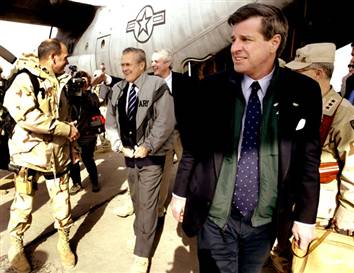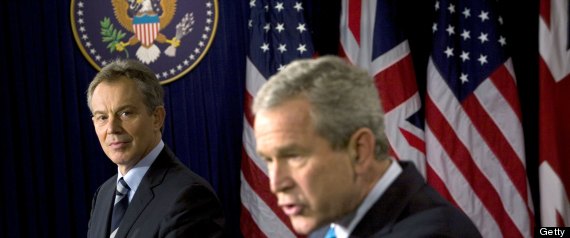It is difficult to under-rate the catastrophic incompetence
and malignant arrogance shown by the US neocons in their wanton destruction of
Iraq, and creation of its disastrous situation today. Whilst we in Britain have once again been served up the
self-righteous image of Tony Blair, telling us all that more war and more
intervention is the only correct way to deal with Syria and Iraq today, we
should at least console ourselves, once we’ve finished throwing whatever items
lie to hand at the television set, with the knowledge that Blair, ignorant,
deluded and narcissistically absorbed in the exercise of war as he was, did not
in fact have any huge impact on the conduct of peace operations in Iraq once it
had been invaded. If any
individuals merit the opprobrium of creating the anarchic mess that is
currently ruining the lives of Iraqis, it is Donald Rumsfeld and his creature,
Paul Bremer.
The manifold failings of the worst man to hold the office of
American Secretary of defence are documented in many places elsewhere. Suffice it to say here that this was
the man who – in pure neo-con fashion – was the strongest advocate of a war
against Iraq in the counsels of the Bush presidency, and the strongest advocate
of doing so with minimum men on the ground. Having scythed through Baghdad, Rumsfeld’s forces were then
confronted with a horrendous security operation, and faced with the Secretary’s
unyielding demand that this too be undertaken with the most underwhelming force
possible. Rumsfeld, indeed, even
stopped one division from going to Baghdad at all, in the belief that it was an
unnecessary expenditure.
The man in the Pentagon thus hamstrung the very forces he
had sent into Iraq right from the start.
There was worse to come, though, in the form of his sweeping aside of
the cautious but politically aware team of American reconstructionists who were
in Baghdad and headed by Jay Garner, in favour of the brash, arrogant and
wholly unsuited Paul Bremer.
Bremer, a man of supreme egoism who likened himself to General
MacArthur, insisted on complete authority to run Iraq. It couldn’t have gone to a less
qualified individual. Bremer had
no knowledge whatever of the Middle East – unlike Garner and his team, or the
Iraqi originally slated to be a co-leader, Zalmay Khalilzad. His foreign experience had been as a
chief of staff to Henry Kissinger, and an ambassador to the Netherlands. It was this lack of any prior
involvement in Mid East affairs that endeared him to the ever cretinous
Rumsfeld.
Bremer arrived in May 2003 to an urgent need to establish
some sort of authority in Baghdad.
His predecessors, Garner and Khalilzad, had been making some useful
moves to incorporate previous Iraqi civil servants and military commanders into
a new governing authority. Bremer
swept this aside, since he had arrived determined to stamp his authority on
Baghdad by dismissing the whole of Saddam Hussein’s political and military
structure. His first order was
thus to bar the top four levels of Saddam’s Baath Party from holding any
government office. As the CIA
station chief in Baghdad noted, Bremer had just disenfranchised 30,000 people.
Bremer’s Order No 2 was even more catastrophic. Despite the talks that had been going
on between Garner and Khalilzad and potentially sympathetic Iraqi army
commanders, Bremer’s order – drafted by former Clinton aide Walter Slocombe –
removed the entire military structure that had existed under Saddam. The reaction in Iraq was furious, with
angry demonstrations in Baghdad and other cities; sixteen US soldiers were
wounded by violent protests in Mosul, a matter of particular annoyance to
General Petraeus whose forces had up to that point been making some headway in
winning over the city’s population.
And if Order No 1 had sent 30,000 officials to unexpected unemployment,
Order No 2 did the same for 300,000 well armed soldiers. It is no surprise to discover that many
of those soldiers formed the nucleus of the Islamic Army of Iraq and Syria that
is causing so much grief today.
Bremer’s orders, confirmed by Rumsfeld, were ill considered
and destructive, but even the logic on which they were based was flawed, not
least because Bremer failed to make even the most cursory investigation of the
country he had come to rule. Had
he done so, he would have discovered that the Iraqi army’s top ranks had far
fewer Baathists than he had thought.
A mere half of the generals,
and only 8,000 of the 140,000 officers and NCO’s were committed Baath
Party members. The Iraqi officers
who had been in discussions with Garner and Khalilzad knew this, but Bremer had
dismissed their contribution out of hand.
He ended up pursuing de-Baathification of a military that hadn’t needed
it.
There is a final indication – and perhaps an appropriate one
– of Paul Bremer’s mendacious ignorance of Iraq and Arab culture. He and Slocombe had devised a scheme to
replace the Iraqi military with a ‘New Iraqi Corps’. NIC, when pronounced in Arabic, sounds very much like “fuck”. It is a fitting commentary on a man who
has retired into a peaceful life of painting and lecturing in the bucolic
countryside of Vermont while the reverberations of his ill-thought out and
gung-ho policies continue to condemn thousands of Iraqis to death, torture, or –
often at best – a wretched existence carved out in the midst of slaughter. Truly, war criminals come in many
different types.
The book “Cobra II” by Michael Gordon and Bernard Trainor
(chapter 24) provides much of the narrative detail referred to above.
This article by Michael Jansen on “The Gulf Today” website provides
an excellent analysis of the results of George W Bush on today’s insurgency.






